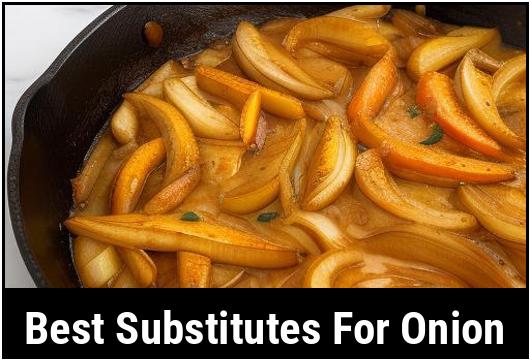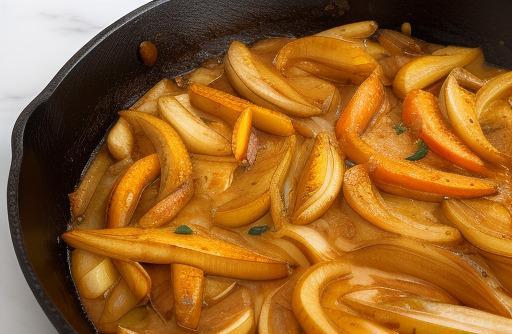- You are here:
- Home »
- Food Substitutes
- » Best Substitutes For Onion
Best Substitutes For Onion

Onions are a staple ingredient in many cuisines around the world, known for their distinctive flavor and aroma. However, there may be times when you don’t have an onion on hand or you’re cooking for someone who is allergic or intolerant to them. In such cases, it’s helpful to know the best substitutes for onion that can still provide a similar taste and texture to your dishes.
Key Takeaways
- Onions add flavor and aroma to dishes, but if you don’t have them or need a substitute, there are several options available.
- Substitutes for onions include shallots, scallions, leeks, garlic, celery, fennel, and spices like onion powder or granulated onion.
- The choice of substitute will depend on the specific dish and the flavor profile you are trying to achieve.
Why You Need A Substitute For Onion
There are several reasons why you might need a substitute for onions. The most common one is simply not having onions available in your kitchen. On occasion, you may also be cooking for someone who is allergic to or intolerant of onions. In these cases, finding suitable alternatives can help you achieve similar flavors in your dishes while catering to dietary restrictions or preferences.
Additionally, some people may dislike the flavor or smell of onions, and they may choose to use substitutes to avoid these characteristics in their meals. Whatever the reason, having knowledge of the best substitutes for onion can be a valuable asset in your culinary repertoire.
Types Of Substitutes For Onion

When looking for a substitute for onion, it’s important to consider the flavor, texture, and cooking properties of the ingredient you’re using as a replacement. Here are some of the best substitutes for onions:
-
Shallots: Shallots are the closest substitute for onions in terms of taste and texture. They have a milder and sweeter flavor compared to onions, but still offer a similar depth of flavor to dishes. Use them in the same quantity as you would use onions.
-
Scallions (Green Onions): Scallions offer a mild onion flavor and are commonly used in Asian cuisines. Both the white and green parts can be used, with the white part having a stronger flavor. Scallions work well in raw dishes, salads, or as a garnish.
-
Leeks: Leeks belong to the onion family and have a similar flavor, although they are milder and slightly sweeter. They can be used as a substitute for onions in various dishes, including soups, stews, and sauces. Remember to clean and slice leeks before using them to remove any dirt trapped between the layers.
-
Garlic: While garlic doesn’t have the same sweet and pungent flavor as onions, it can still be used as a flavor enhancer in dishes. Use garlic cloves in moderation, as they have a more intense flavor compared to onions. Minced garlic can be a great substitute in sautés, stir-fries, and sauces.
-
Celery: Although celery doesn’t have the exact same flavor as onions, it can provide a similar crunch and subtle savory note. It works well as a substitute in salads, soups, and stews. Slice or dice the celery stalks and use them in the same quantity as you would use onions.
-
Fennel: Fennel has a distinct anise-like taste, but it can offer a similar aromatic flavor to certain dishes. Use thinly sliced fennel bulbs as a substitute for onions in salads and cooked dishes. The flavor profile of fennel may not work well in all recipes, so keep this in mind when deciding on a suitable substitute.
-
Onion Powder or Granulated Onion: These are dehydrated forms of onions, and they provide a concentrated onion flavor. They are excellent substitutes if you want to add onion flavor to your dishes without the texture or bulk of fresh onions. Use around one tablespoon of onion powder or granulated onion for every medium-sized onion called for in the recipe.
Best Substitutes For Onion
Choosing the right substitute for onion depends on the specific dish you’re cooking and the desired flavor profile you want to achieve. Here are some situations where certain substitutes work best:
-
For soups, stews, and sauces: Leeks and shallots are excellent substitutes as they provide a similar flavor profile, enhancing the taste of the dish. Leeks work particularly well in creamy soups, while shallots are versatile and can be used in a wide variety of dishes.
-
For raw dishes and salads: Scallions are the go-to substitute as they offer a mild and fresh onion flavor. You can use both the white and green parts, slicing them thinly or chopping them into small pieces.
-
For sautés and stir-fries: Garlic can work as a substitute, adding a savory note to your dishes. Remember to use it in moderation, as garlic has a more intense flavor compared to onions.
-
For adding onion flavor without the texture: Onion powder or granulated onion are perfect substitutes when you want to infuse dishes with onion flavor without the bulk. They work well in dry rubs, marinades, and seasoning blends.
Choosing The Right Substitute For Onion
When choosing a substitute for onion, it’s important to consider the overall flavor profile of the dish you’re cooking. Some substitutes may offer a milder or sweeter flavor, while others may have a more intense or aromatic taste. Here are a few tips to help you choose the right substitute for onion:
-
Consider the dish: Think about the flavors and ingredients in the recipe you’re making. If the dish already has strong flavors, you may want to opt for a milder substitute like shallots or scallions. On the other hand, if you’re looking to enhance the overall depth of flavor, garlic or onion powder can be great choices.
-
Experiment with different substitutes: Don’t be afraid to experiment with different substitutes to find the one that works best for you. Each substitute will bring its own unique flavor and texture to the dish, so it can be fun to try different combinations and see what works best for your taste buds.
-
Adjust quantities: Keep in mind that the flavor of the substitute may differ slightly from that of the onion. You may need to adjust the quantity or add additional seasoning to ensure the dish still tastes balanced.
Pro Tip:
If you’re using a substitute that has a milder flavor than onions, such as shallots or scallions, consider adding a small amount of garlic or onion powder to enhance the overall onion taste in your dish.
Cooking With Substitutes For Onion
When using substitutes for onion in recipes, it’s important to consider how they will be cooked. Some substitutes can be used in the same way as onions, while others may require slight adjustments. Here are a few tips for cooking with substitutes for onion:
-
Shallots, scallions, and leeks can typically be used in the same way as onions. They can be sautéed, caramelized, or used as a base for various dishes.
-
Garlic should be added towards the end of the cooking process to prevent it from burning and becoming bitter. It can be minced, sautéed, or roasted to bring out its flavors.
-
Celery and fennel can be used as a replacement for onions in salads, stir-fries, and stews. They can be added raw or cooked, depending on your preference.
-
Onion powder or granulated onion should be added during the cooking process to allow the flavors to meld with the other ingredients. Be cautious not to use too much, as they can overpower the dish.
Recipes Using Substitutes For Onion
Here are a few recipe ideas that showcase the use of substitutes for onion:
-
Creamy Potato Leek Soup:
- Sauté sliced leeks in butter until softened.
- Add diced potatoes, vegetable broth, and seasonings.
- Simmer until the potatoes are tender.
- Puree the mixture until smooth, and serve hot with your favorite garnishes.
-
Spaghetti Aglio e Olio:
- Sauté minced garlic in olive oil until fragrant.
- Cook spaghetti according to package instructions.
- Toss the cooked spaghetti in the garlic-infused oil.
- Garnish with chopped parsley, grated cheese, and red pepper flakes.
-
Asian Stir-Fried Vegetables:
- Heat oil in a wok or skillet and add sliced scallions.
- Stir-fry until fragrant before adding your choice of vegetables.
- Cook until the vegetables are crisp-tender.
- Season with soy sauce, sesame oil, and your preferred spices.
-
Chicken and Fennel Salad:
- Thinly slice fennel bulbs and combine with cooked and shredded chicken.
- Add chopped celery, lemon juice, olive oil, and salt.
- Toss together and refrigerate for at least an hour to allow the flavors to meld.
Storage And Shelf Life Of Substitutes
To ensure the freshness and quality of your substitutes for onions, it’s important to store them properly. Here are some storage tips for the different substitutes:
-
Shallots: Store shallots in a cool, dry place with good ventilation. They can last for several weeks if stored properly.
-
Scallions: Place scallions in a glass of water, similar to cut flowers. Cover them with a plastic bag and store them in the refrigerator. They can last up to a week using this method.
-
Leeks: Keep leeks unwashed in the refrigerator, wrapped loosely in a plastic bag. They should stay fresh for up to two weeks.
-
Garlic: Store garlic bulbs in a cool, dry place away from direct sunlight. They can last for several months.
-
Celery: Wrap celery stalks tightly in aluminum foil or place them in a perforated plastic bag in the refrigerator. Celery can stay fresh for up to two weeks.
-
Fennel: Keep fennel bulbs in the refrigerator, loosely wrapped in plastic wrap or stored in a perforated plastic bag. They should last for up to a week.
-
Onion Powder and Granulated Onion: Store these dehydrated forms in airtight containers in a cool, dry place. They can last for six months to a year.
Conclusion
While onions are a versatile and flavorful ingredient, there are several suitable substitutes that can be used when onions are unavailable or not preferred. Shallots, scallions, leeks, garlic, celery, fennel, and onion powder are great alternatives that can add depth, aroma, and taste to your dishes. Understanding the flavor profiles and cooking properties of these substitutes can help you choose the right one for your specific recipe. So the next time you find yourself without onions, don’t fret, and confidently reach for a suitable alternative to maintain the deliciousness in your culinary creations.
FAQS
What Are Some Low-fodmap Substitutes For Onion?
For those with digestive issues, low-FODMAP vegetables such as leeks, scallions (green onions), chives, and garlic-infused oil can be used as onion substitutes.
What Can I Use Instead Of Onion In Recipes That Call For Raw Onions?
Try using chopped bell pepper or cucumber as a raw onion substitute. Both offer a similar crunchy texture and mild, sweet flavor.
What Are Some Spices That Can Replace Onion Powder In A Recipe?
Cumin, coriander, and smoked paprika can all work as flavorful alternatives to onion powder. Each spice brings its unique taste to a dish, so experiment to find the best match.
Can I Use Shallots As An Onion Substitute?
Yes, shallots have a mild onion-like flavor that works well in many dishes. Just note that they also contain fructans like onions, so they may not be suitable for those following a low-FODMAP diet.
What Can I Use Instead Of Onion In French Onion Soup?
For a similar flavor, try using leeks or shallots in place of onions in French onion soup. You can also add a splash of balsamic vinegar or Worcestershire sauce to help mimic the rich, savory taste of caramelized onions.
Sources
About the Author Jenny
I'm Jenny, a housewife with an unwavering passion for food. My culinary journey began with my grandmother's kitchen, and it's now a full-fledged food blog. I've turned my love for cooking into a creative outlet, sharing recipes and stories with a global community of fellow food enthusiasts. It's proof that being a housewife can also mean pursuing your passions and savoring life's delectable moments.
